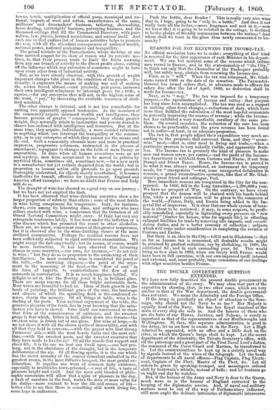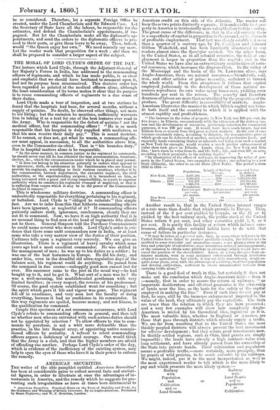THE DOUBLE GOVERNMENT QUESTION EXTENDED.
WE have now fully described the present double government in the administration of the army. We may close that part of the exposition by showing that, in two other cases, which are very similar to that of the War department, the doutle government does not exist. We mean the Admiralty and the Foreign Office.
If the Army is peculiarly an object of attention to the Sove- reign, why should not the Navy be so too ? Her Majesty is equally head of the Navy. She has her Royal standard at the main of every ship she sails in. And the honour of those who are the heirs of our Howes, Jervises, and Nelsons, is surely as important as that of the representatives of our Marlboroughs and Wellingtons. If, then, this separate administration is good in the Army, let us see how to create it in the Navy. Let a High Admiral be appointed, with an office and a little dock on the river, in which the Queen's barge shall be kept. Let the secret department of the Admiralty, the Private Secretary's office, with all the patronage and a great part of the First Naval Lord's duties, the command of the Coast Guard and Marines, be transferred to it. Let the communications be kept up in a strictly naval way by signals instead of the wires of the telegraph. Let the heads of departments be all naval officers—Flag Captain, Flag Lieute- nant, Captain of the Fleet, Master of the Fleet, &c. Let all orders be given by speaking-trumpet, and messengers ordered aloft by boatswain's whistle, instead of bells ; and let business go on night and day by watches. But, if the honour of the Army and Navy is dear to the Queen, much more so is the honour of England entrusted to the keeping of the diplomatic service. And, if naval and military matters must be out of the way of Parliamentary influence, still more ought the delicate intricacies of diplomatic intercourse
be so considered. Therefore, let a separate Foreign Office be created, under the Lord Chamberlain and Sir Edward Cost. Let the Secretary of State have all the labour, be responsible for the estimates, and defend the Chamberlain's appointments, if im- pugned. But let the Chamberlain make all the diplomatic ap- pointments, and send the orders to the diplomatic officers to pro- ceed to their posts, or give them leave to be away, Then, indeed, would "the Queen enjoy her own." We need scarcely say more. Let the reader work that proposition for a week ; and then we shall be prepared to consider a larger aspect of the subject.



























 Previous page
Previous page